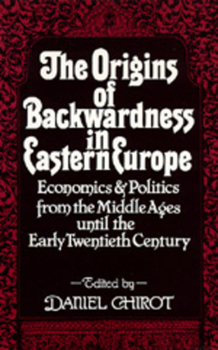The Origins of Backwardness in Eastern Europe: Economics and Politics from the Middle Ages until the Early Twentieth Century
Select Format
Select Condition 
Book Overview
Reaching back centuries, this study makes a convincing case for very deep roots of current Eastern European backwardness. Its conclusions are suggestive for comparativists studying other parts of the world, and useful to those who want to understand contemporary Eastern Europe's past. Like the rest of the world except for that unique part of the West which has given us a false model of what was "normal," Eastern Europe developed slowly. The weight of established class relations, geography, lack of technological innovation, and wars kept the area from growing richer.
In the nineteenth century the West exerted a powerful influence, but it was political more than economic. Nationalism and the creation of newly independent aspiring nation-states then began to shape national economies, often in unfavorable ways.
One of this book's most important lessons is that while economics may limit the freedom of action of political players, it does not determine political outcomes. The authors offer no simple explanations but rather a theoretically complex synthesis that demonstrates the interaction of politics and economics.
In the nineteenth century the West exerted a powerful influence, but it was political more than economic. Nationalism and the creation of newly independent aspiring nation-states then began to shape national economies, often in unfavorable ways.
One of this book's most important lessons is that while economics may limit the freedom of action of political players, it does not determine political outcomes. The authors offer no simple explanations but rather a theoretically complex synthesis that demonstrates the interaction of politics and economics.
Format:Paperback
Language:English
ISBN:0520076400
ISBN13:9780520076402
Release Date:August 1991
Publisher:University of California Press
Length:269 Pages
Weight:0.86 lbs.
Dimensions:0.7" x 6.0" x 8.9"
Customer Reviews
1 rating
Marching in place
Published by Thriftbooks.com User , 16 years ago
When the papers in the book were presented at a conference in 1984, the question of why Eastern Europe had lagged Western Europe economically for so many centuries were purely academic. Whatever had happened in the past, the reason the East continued to lag was obvious. Now things have changed, and there is a practical reason for asking what factors retarded the East from reaching "take off." The seven academics -- from America, Hungary, Poland and Germany --were concerned to throw cold water on world system theory, an idea associated most prominently with Immanuel Wallerstein. This theory blames the rich for the stagnation of the poor and has been used to blame America for the backwardness of Latin America.. The authors convincingly show that, whatever merit world system theory may have elsewhere, it cannot account for the fact that Eastern Europe failed to industrialize and, to a great extent, failed even to modernize its agriculture. For example, the sharecropping farms called ciftlik that arose in the Ottoman Balkans did not, for the most part, deal in exports to the rich countries, did not arise in the time sequence required by world system theory and, most damning for the theory, did not produce allegedly harmful foreign investment in the backward areas. The authors offer a variety of ideas about why Eastern Europe remained poor, always riffing off Bohemia, which (somewhat dubiously) is assigned to the east although it is difficult on objective measurements to separate it from the west. The Czechs may have been a distant people of whom the English politicians knew nothing -- although English entrepreneurs had been very successful there from the early 18th century -- but by most objective measurements they were as western as the west. The authors do not consider Austria part of the east. The seven authors are stimulating in their frankness. I doubt a book with "backwardness" in the title would be issued by an American academic press these days. They cover a lot of ground. But two things are missing. One is any assignment of influence to religion. The Hungarian Peter Gunst does wonder, in an endnote, if the lack of a Reformation affected the east (Bohemia, of course, had one); and the American John Lampe does mention the hostility of the Moslem clergy to technology, but only as a rather late effect. To my mind, the dead hand of religion, whether Catholic, Orthodox or Moslem, didn't affect only social relations, it must have affected economic ones as well. (Whether Judaism might have had an economic effect would be a moot question, since the Jews were so hindered by legal barriers that they remained very poor. Catholicism and Orthodoxy certainly deserve some of the blame for the antiJewish laws and at least in that respect, religion retarded economic improvement.) Also, for 500 years, the eastern Baltic had a large trade and a big balance of payments in its favor with Britain for naval stores. If you are going to attack world sys






